Welcome to LerriHost’s in-depth guide on Local SEO. In today’s digital world, boosting your local search rankings is key to success. This guide will cover the basics of Local SEO, helping you understand how to enhance your online presence locally.
Local SEO is a specific SEO approach aimed at improving your visibility in local search results. By using effective Local SEO strategies, your business can be more visible when people in your area search for what you offer.
In this guide, we’ll dive into practical methods to improve your local search rankings. We’ll look at optimising your Google Business Profile and creating a strong local content strategy. This guide is for both small business owners and marketing professionals, aiming to help you succeed in the local digital market.
Key Takeaways
- Local SEO is essential for improving business visibility in local search results
- Optimising your Google Business Profile is critical for local search success
- Creating location-specific content can enhance your local search rankings
- Managing online reviews is vital for local SEO
- Mobile optimisation is increasingly important for local search visibility
Understanding Local SEO Fundamentals
Local SEO basics are essential for businesses aiming to increase their local search visibility. This special SEO approach enhances a company’s online presence within a specific area. It’s vital for businesses looking to connect with local customers.
What Makes Local SEO Different from Traditional SEO
Local SEO focuses on location-specific elements, unlike traditional SEO, which targets a broader audience. It zeroes in on local customers, requiring unique strategies. Optimising for ‘near me’ searches and using location-based keywords are key.
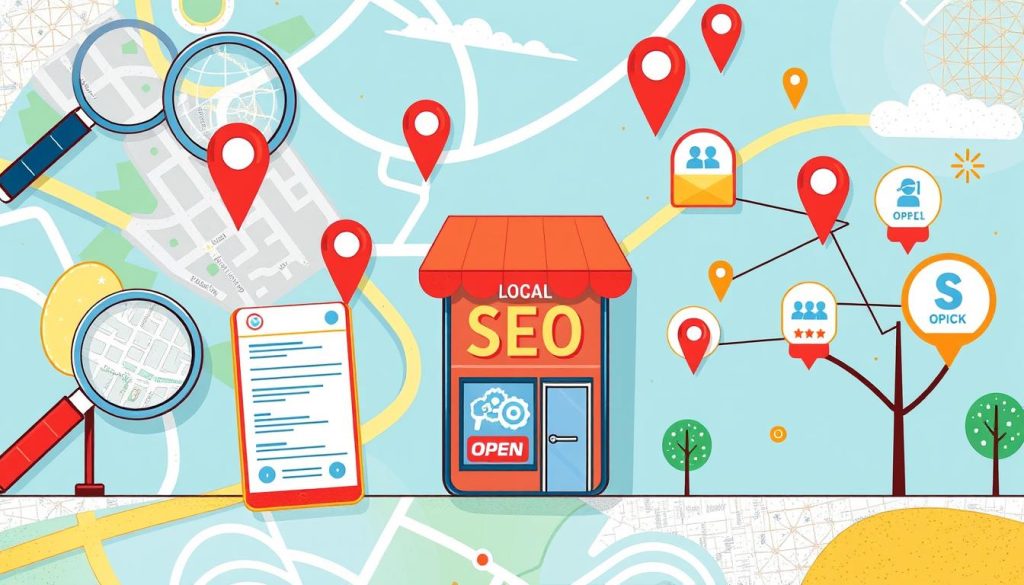
The Impact of Local Search on Business Growth
The impact of local search on businesses is significant. It boosts foot traffic, phone calls, and online conversions. Small and medium-sized enterprises benefit greatly, as it levels the playing field against larger competitors.
“46% of all Google searches are looking for local information.” – Google
Key Components of Local Search Rankings
Understanding local ranking factors is key to local SEO success. These include:
- Google Business Profile optimisation
- Local citations and directories
- On-page SEO with location-specific content
- Customer reviews and ratings
- Mobile-friendliness
| Local Ranking Factor | Importance | Impact on Local SEO |
|---|---|---|
| Google Business Profile | High | Crucial for local visibility |
| Local Citations | Medium | Builds trust and authority |
| On-page SEO | High | Improves relevance for local queries |
| Customer Reviews | High | Influences consumer decisions |
| Mobile Optimisation | Medium | Enhances user experience |
By mastering these local SEO fundamentals, businesses can significantly improve their visibility in local search results. This drives growth and customer engagement in their target markets.
Getting Started with Google Business Profile
A Google Business Profile (GBP) is vital for local businesses looking to enhance their online presence. It’s a powerful tool that connects you with possible customers and elevates your local search rankings. Let’s dive into setting up and optimising your GBP for the best results.
Creating and Claiming Your GBP Listing
To begin, head over to the Google Business Profile website and follow these steps:
- Sign in with your Google account
- Enter your business name and address
- Choose your business category
- Add contact information
- Verify your listing
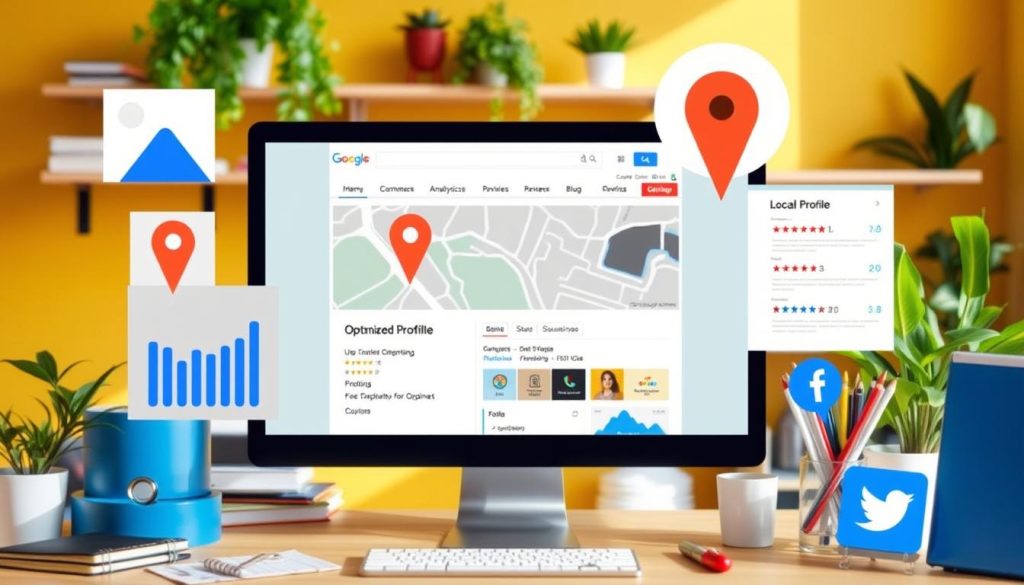
Optimising Your Business Information
Optimising your GBP is key to drawing in local customers. Make sure your profile has:
- Accurate business hours
- High-quality photos of your business
- A detailed business description
- Relevant attributes (e.g., WiFi, parking)
Managing Customer Reviews and Responses
Customer reviews are essential for local SEO. Encourage happy customers to share their positive experiences. Respond quickly to all reviews, whether they’re positive or negative. This shows you value their feedback and are dedicated to top-notch service.
| Review Management Tips | Impact on Local SEO |
|---|---|
| Respond to all reviews within 24 hours | Improves customer trust and engagement |
| Use keywords in your responses | Enhances search visibility |
| Address negative feedback professionally | Demonstrates commitment to customer satisfaction |
By adhering to these tips, you’ll craft a strong Google Business Profile. It will attract local customers and improve your search rankings.
Local SEO On-Page Optimisation
On-page SEO is vital for boosting your local business’s visibility. By optimising for local content, you can enhance your search engine rankings. This attracts more customers from your area.

To boost your local SEO, start by adding local keywords to your website content. Include them in your homepage, service pages, and blog posts. For instance, if you’re a bakery in Manchester, use terms like “best cakes in Manchester” or “artisan bread shop in Manchester city centre”.
Optimising meta tags and headers is also key. Make sure your title tags and meta descriptions include relevant local keywords. They should accurately describe your business and location. This helps search engines see your local relevance and boosts click-through rates from search results.
Creating content relevant to your local area is another critical aspect. Write about local events, share community news, or provide guides to local attractions. This not only optimises your content for local searches but also engages your audience. It makes your business seen as a local authority.
| On-Page Element | Local SEO Best Practice |
|---|---|
| Title Tags | Include city name and primary service |
| Meta Descriptions | Mention location and unique selling points |
| Header Tags | Use local keywords in H1 and H2 tags |
| Content | Create location-specific pages and blog posts |
| Internal Linking | Link to location pages and local content |
By applying these on-page SEO strategies, you’ll see a rise in your local search visibility. This will attract more customers to your business.
Building a Local-Friendly Website Structure
A well-crafted local website structure is the foundation of successful local SEO. It focuses on key elements to boost visibility in local search results.
Creating Location-Specific Landing Pages
Location pages are vital for targeting local audiences. They should include:
- Unique content for each location
- Local contact details and opening hours
- Area-specific services or products
- Customer testimonials from local clients
Creating these tailored pages helps businesses serve different areas effectively. It also improves their local search rankings.
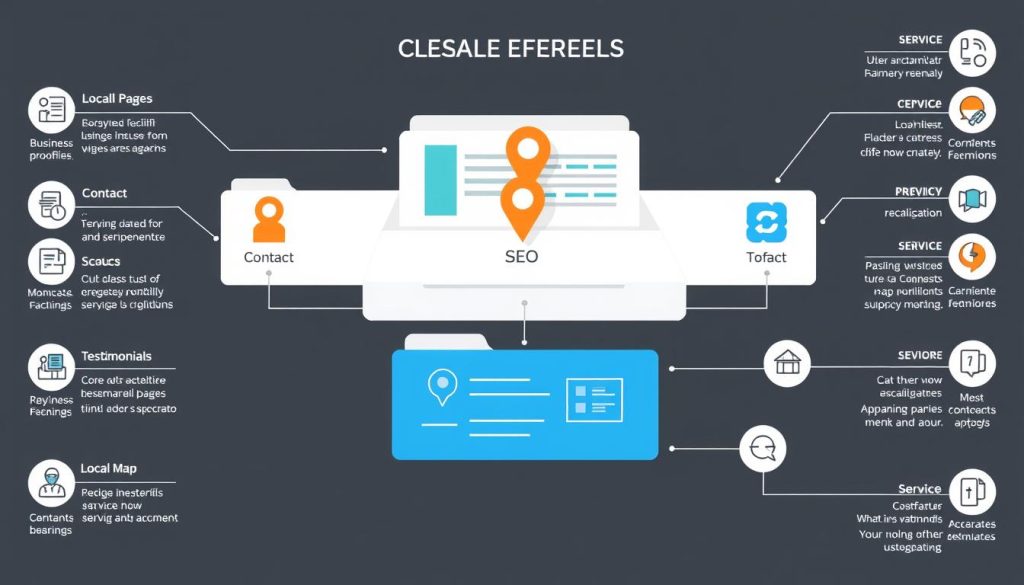
Implementing Local Schema Markup
Schema markup enhances how search engines display local business information. It includes:
| Schema Type | Information Included |
|---|---|
| LocalBusiness | Name, address, phone number |
| GeoCoordinates | Latitude and longitude |
| OpeningHoursSpecification | Business hours |
| Review | Customer ratings and reviews |
Using these schema types boosts local search visibility. It also provides users with more detailed search results.
Mobile Optimisation for Local Search
Most local searches are done on mobile devices. Mobile optimisation is critical. Focus on:
- Responsive design that adapts to different screen sizes
- Fast loading times for mobile pages
- Easy-to-use navigation for mobile users
- Click-to-call buttons for quick contact
By prioritising mobile optimisation, businesses enhance local search performance. They also offer a better user experience for customers.
Local Citation Building and Management

Building and managing local citations is key to boosting your business’s visibility in local search results. Local citations are online mentions of your business’s name, address, and phone number (NAP) on various platforms. These citations are vital for establishing your business’s credibility and improving its local search rankings.
To start building local citations, focus on popular business directories and industry-specific platforms. Some top directories include:
- Google Business Profile
- Yelp
- Yellow Pages
- TripAdvisor
- Facebook Business
Maintaining NAP consistency across all platforms is essential. Ensure your business information is accurate and up-to-date on every listing. Inconsistencies can confuse search engines and customers, negatively impacting your local SEO efforts.
| Citation Type | Examples | Importance |
|---|---|---|
| General Directories | Google Business Profile, Yelp | High |
| Industry-Specific | TripAdvisor (for hospitality) | Medium to High |
| Local Directories | Chamber of Commerce, Local Business Associations | Medium |
Regularly audit your citations to identify and correct any inaccuracies. Use citation management tools to streamline this process and ensure your NAP information remains consistent across all platforms. By effectively managing your local citations, you’ll strengthen your local SEO strategy and improve your chances of appearing in relevant local search results.
Developing a Local Content Strategy
A robust local content strategy is essential for businesses looking to engage with their community. By focusing on local content marketing, you can enhance your visibility and relevance within your area.
Creating Neighbourhood-Specific Content
Creating content that resonates with your local audience is vital. Emphasise the unique aspects of your neighbourhood, local landmarks, or community heroes. This strategy builds a strong connection with residents and showcases your local expertise.

Local Event Coverage and Community Engagement
Covering local events is an excellent way to demonstrate community engagement. Attend and report on festivals, charity drives, or school functions. This not only provides valuable content but also positions your business as an active community member.
| Event Type | Content Ideas | Engagement Strategy |
|---|---|---|
| Local Festival | Event preview, live updates, photo gallery | Social media contest, volunteer participation |
| Charity Drive | Cause spotlight, donation guide, impact story | Fundraising campaign, staff involvement |
| School Function | Student achievements, event recap, teacher interviews | Sponsorship, educational workshops |
Leveraging Local News and Trends
Stay attuned to local trends and news to create timely, relevant content. This could include commenting on local developments, celebrating community achievements, or addressing area-specific concerns. By tapping into these local trends, you’ll demonstrate your business’s commitment to the community and improve your local SEO efforts.
Local Link Building Strategies

Building local backlinks is essential for boosting your business’s visibility in local search results. Forming partnerships with nearby businesses and organisations is an effective strategy. This approach not only strengthens your local presence but also creates valuable networking opportunities.
Local influencer outreach is another powerful tactic. Collaborating with respected individuals in your area can significantly expand your reach. Consider inviting local bloggers or social media personalities to review your products or services. Their endorsements can lead to increased trust and credibility among your target audience.
- Sponsor local events or sports teams
- Participate in community clean-up initiatives
- Offer expert advice to local news outlets
- Create location-specific content for your website
Remember, quality trumps quantity in local link building. Focus on securing links from reputable local sources. Avoid amassing a large number of low-quality backlinks. By implementing these strategies consistently, you’ll enhance your local SEO efforts and attract more customers to your business.
Managing Online Reviews and Reputation
In today’s digital world, online reviews and reputation management are key to local SEO success. Businesses must engage with customer feedback to build trust and enhance their search visibility.

Generating Positive Customer Reviews
It’s vital to encourage happy customers to share their positive experiences. Here are some strategies to consider:
- Send follow-up emails after purchases
- Offer incentives for leaving reviews
- Train staff to request reviews in person
- Make the review process simple and accessible
Responding to Negative Feedback
Dealing with negative feedback professionally is essential for reputation management. When facing unfavourable reviews:
- Respond promptly and politely
- Acknowledge the customer’s concerns
- Offer solutions or compensation when appropriate
- Take the conversation offline if necessary
Monitoring Brand Mentions
It’s important to track brand mentions across different platforms to maintain a positive online image. Use tools to monitor:
- Social media platforms
- Review sites
- Industry forums
- News articles
| Review Platform | Impact on Local SEO | Customer Trust Factor |
|---|---|---|
| Google Business Profile | High | Very High |
| Yelp | Medium | High |
| TripAdvisor | Medium | High |
| Low | Medium |
By effectively managing online reviews and customer feedback, businesses can enhance their local SEO performance. This helps build a strong, positive reputation in their community.
Local Social Media Marketing
Social media is a potent tool for local businesses to increase visibility and connect with their community. By using platforms like Facebook, Instagram, and Twitter, companies can establish a robust local presence. This, in turn, can boost foot traffic to their physical locations.
To truly benefit from social media marketing, businesses must engage with their local community. This means sharing content that speaks to the local audience. Examples include:
- Updates about local events
- Behind-the-scenes glimpses of the business
- Spotlights on local customers or employees
- Collaboration announcements with other local businesses

Consistency is essential for social signals. Ensure your business information, such as name, address, and phone number (NAP), is the same across all platforms. This consistency aids search engines in verifying your business’s authenticity. It also enhances your local search rankings.
“Social media is not just about broadcasting your message, but about building relationships with your local community.”
To gauge the success of your local social media campaigns, monitor key metrics. These include:
| Metric | Importance |
|---|---|
| Engagement rate | Indicates how well your content resonates with the local audience |
| Check-ins | Shows physical visits prompted by social media |
| Local follower growth | Reflects increasing community interest |
| Website traffic from social | Measures the effectiveness of social media in driving online visits |
By adopting these strategies and tracking these metrics, local businesses can leverage social media. This can significantly improve their local SEO efforts. It also helps in building stronger community ties.
Understanding Local Search Analytics
Local search analytics are essential for a thriving local SEO strategy. They enable businesses to track performance and gauge engagement. This allows for informed decisions to enhance online presence.
Tracking Local Search Performance
To assess the success of your local SEO, focus on critical metrics in Google Analytics and Search Console. Keep an eye on organic traffic from local searches, click-through rates, and rankings for location-specific keywords.
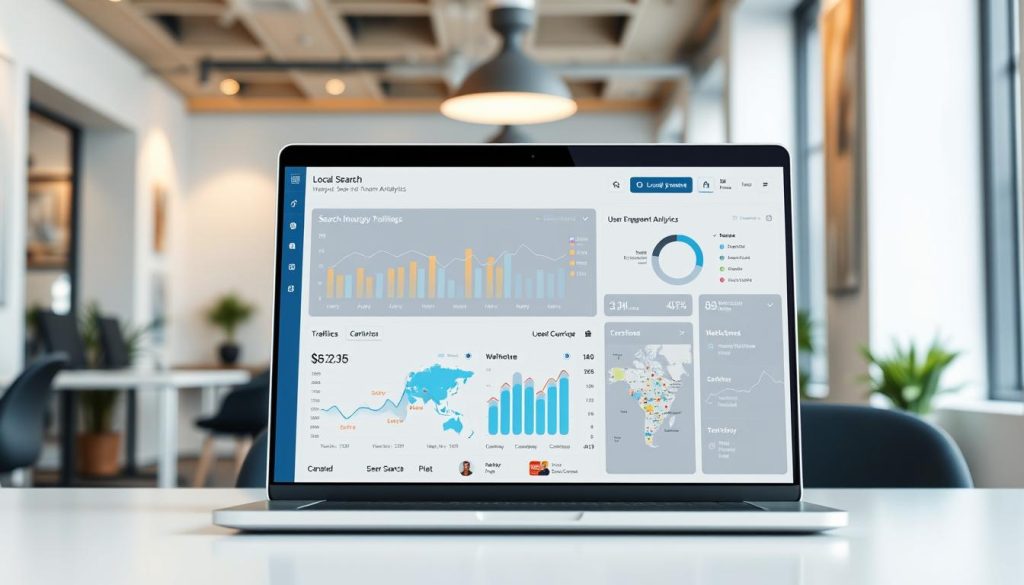
Measuring Local Engagement Metrics
Local engagement extends beyond website visits. Monitor phone calls, direction requests, and reviews via your Google Business Profile insights. These metrics offer insights into customer behaviour and intent.
| Metric | Importance | Tool |
|---|---|---|
| Click-through Rate | Indicates listing attractiveness | Google Search Console |
| Phone Calls | Shows direct customer interest | Google Business Profile |
| Direction Requests | Reflects intent to visit | Google Business Profile |
Using Analytics to Refine Strategy
Utilise these insights to enhance your local SEO strategy. Optimise content based on high-traffic keywords. Create similar content if it boosts phone calls. Regular tracking ensures continuous improvement and a data-driven approach.
Mobile Optimisation for Local Search
In today’s digital world, mobile-friendly design is vital for local businesses. With the surge in local mobile search, making your website accessible on smartphones and tablets is now a must. It’s not just a choice; it’s a necessity.
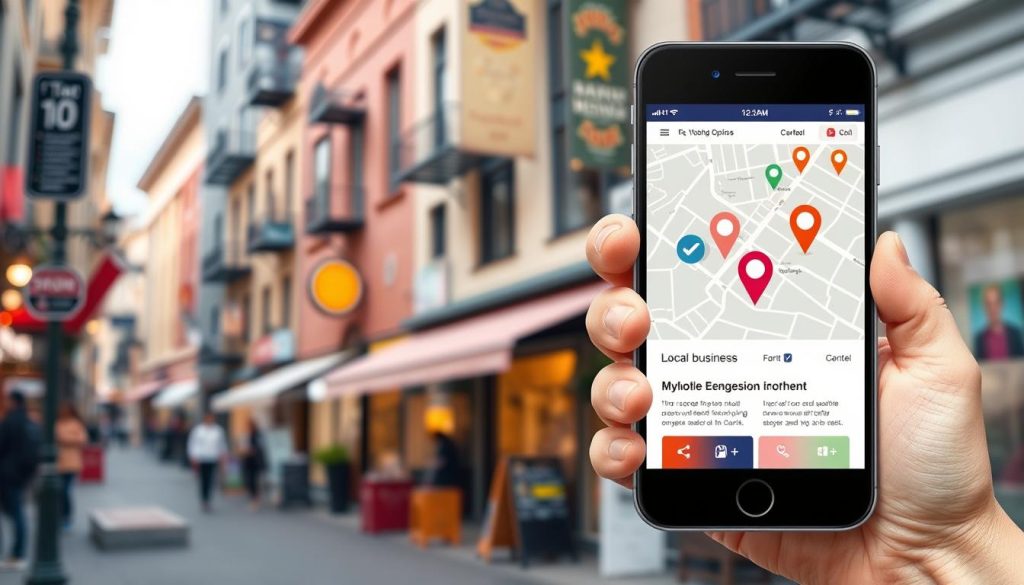
A responsive website adjusts perfectly to various screen sizes, ensuring a seamless user experience. This not only delights visitors but also enhances your search engine rankings. Google gives preference to mobile-friendly sites in local search results, making it a cornerstone of your Local SEO strategy.
Page speed is another critical factor. Mobile users expect fast loading times, and search engines reward sites that load quickly. To improve your site’s mobile performance, compress images, reduce code, and use browser caching.
Voice search optimisation is gaining importance for local businesses. As more people use voice assistants to find local services, incorporating natural language and long-tail keywords into your content can help capture these queries.
- Use location-based keywords in your content
- Ensure your contact information is easily accessible
- Implement schema markup for local businesses
Regular testing is essential to maintain a superior mobile experience. Utilise Google’s Mobile-Friendly Test tool to spot and rectify any issues. By focusing on mobile optimisation, you’ll boost your visibility in local search results and draw in more customers to your business.
Local SEO Tools and Resources by LerriHost
LerriHost provides a suite of Local SEO tools and resources to enhance your local search visibility. These tools aim to simplify your Local SEO efforts, positioning you ahead in your market.
Essential Local SEO Tools
LerriHost offers a variety of essential Local SEO tools to optimise your online presence:
- Keyword research tool to identify high-value local search terms
- Rank tracking software to monitor your position in local search results
- On-page optimisation checker to ensure your website is local-friendly

Competitor Analysis Tools
Understanding your local competitors is key to success. LerriHost’s competitor analysis tools enable you to:
- Analyse local competitors’ keywords and backlink profiles
- Compare your Google Business Profile to others in your area
- Identify gaps in your local SEO strategy
Citation Management Platforms
Consistent business information across the web is essential for Local SEO. LerriHost’s citation management platforms assist you in:
- Audit existing citations for accuracy
- Build new citations on high-authority local directories
- Update your NAP (Name, Address, Phone) information across multiple platforms
| Tool Category | Key Features | Benefits |
|---|---|---|
| Local SEO Tools | Keyword research, rank tracking, on-page optimisation | Improved local search visibility |
| Competitor Analysis | Keyword comparison, backlink analysis, GBP benchmarking | Strategic insights for outperforming local rivals |
| Citation Management | Citation audit, building, and updating | Consistent online presence and improved local rankings |
Common Local SEO Mistakes to Avoid
Local SEO can be transformative for businesses, yet it’s simple to stumble into common pitfalls. Let’s examine some frequent local SEO errors and best practices to sidestep them.

One critical optimisation error is inconsistent NAP (Name, Address, Phone) information across online platforms. This inconsistency confuses search engines and prospective customers. To prevent this, ensure a uniform NAP across all your online listings and directories.
Another significant blunder is neglecting mobile optimisation. Given that most local searches occur on mobile devices, a non-responsive website can severely hinder your local SEO efforts. Make sure your site is mobile-friendly and loads swiftly on all devices.
Ignoring customer reviews is a missed opportunity in local SEO. Reviews not only sway prospective customers but also affect your search rankings. Actively encourage happy customers to leave reviews and promptly respond to both positive and negative feedback.
- Failing to create locally relevant content
- Overlooking local keywords in your website copy
- Not optimising Google Business Profile
Remember, local SEO is an ongoing endeavour. Regularly audit your online presence, stay abreast of local SEO best practices, and adjust your strategy as needed. By avoiding these common mistakes, you’ll be well on your way to increasing your local visibility and attracting more customers to your business.
Future Trends in Local Search
Local search trends are rapidly evolving, driven by technological advancements. Businesses must stay ahead of these changes to maintain their competitive edge in the digital landscape.
Voice Search Optimisation
Voice search is becoming increasingly popular, with more users opting for hands-free queries. To optimise for voice search, focus on natural language and long-tail keywords that mimic conversational patterns. Ensure your content answers specific questions users might ask about your local business.

Local AR and VR Integration
Augmented reality (AR) and virtual reality (VR) are set to transform local search experiences. These technologies can offer immersive previews of businesses, products, and services. Consider creating virtual tours or AR-enhanced product displays to give customers a taste of what your business offers before they visit in person.
AI in Local Search
Artificial intelligence is reshaping local search algorithms and user experiences. AI-powered chatbots can provide instant, personalised responses to customer queries, improving engagement and satisfaction. Machine learning algorithms are also becoming better at understanding user intent and delivering more relevant local search results.
To prepare for these advancements, businesses should:
- Invest in voice-optimised content
- Explore AR/VR applications for their products or services
- Leverage AI-driven tools for customer interactions and data analysis
- Continuously update their local SEO strategies to align with emerging technologies
By embracing these future trends, local businesses can enhance their visibility and provide superior user experiences in an increasingly digital world.
Local SEO Case Studies
Real-world examples of local SEO success stories offer valuable insights into effective strategies and their impact on business growth. Let’s explore a few case studies that demonstrate the power of local SEO and its return on investment (ROI).

A family-owned bakery in Manchester struggled with online visibility. After implementing a local SEO campaign, they saw remarkable results:
- 300% increase in website traffic
- 150% rise in customer enquiries
- 75% boost in foot traffic to their shop
The bakery optimised their Google Business Profile, created location-specific content, and encouraged customer reviews. This strategy led to a significant ROI, with a 200% increase in revenue within six months.
Another success story comes from a London-based physiotherapy clinic. Their local SEO efforts included:
- Building local citations
- Implementing schema markup
- Developing neighbourhood-specific landing pages
The results were impressive:
| Metric | Before | After | Improvement |
|---|---|---|---|
| Local Search Rankings | Page 3 | Top 3 Results | 600% increase |
| Monthly Appointments | 50 | 200 | 300% increase |
| Monthly Revenue | £10,000 | £40,000 | 300% increase |
These case studies highlight the substantial impact of well-executed local SEO strategies on business visibility, customer engagement, and overall ROI.
Conclusion
Local SEO is a potent tool for businesses aiming to increase their local presence. This guide has outlined key strategies, from optimising Google Business Profiles to crafting localised content. By adopting these steps, you can greatly enhance your local search rankings.
Local SEO is an ongoing endeavour, not a one-off task. Search algorithms and customer habits are constantly evolving. It’s vital to stay updated with industry trends and adjust your strategies as needed. Regularly reviewing and refining your local SEO tactics is essential for sustaining and boosting your local search visibility.
It’s time to apply what you’ve learned. Begin by assessing your current local SEO standing and focus on areas needing improvement. Whether it’s making your website more relevant to local searches or acquiring quality local citations, each action moves you closer to leading in local search results. With persistence and the correct strategy, you can draw in more local customers and expand your business in the digital era.
